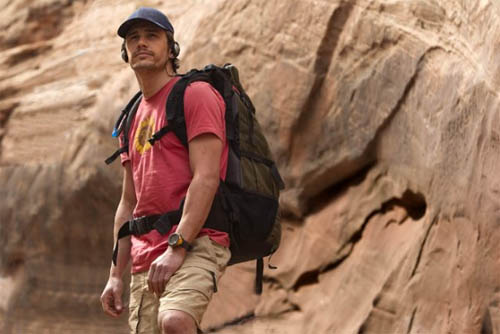Review: 127 Hours

In a very telling scene early in 127 Hours, Aron Ralston (James Franco) is biking at breakneck speed through the Utah desert when he takes a nasty tumble and slams into a spindly, scratchy bush. Unfazed and eternally cocky, he shakes off his pain and is back on his bike almost as quickly as he fell, as if to prove he's more than a match for any trouble that comes his way in the wilderness.
Of course, anyone familiar with the true story that inspired 127 Hours knows that this cockiness nearly led to Ralston's untimely demise. Another reckless, nasty fall left him stuck for five days in a deep crevasse with his arm pinned by a boulder. Unable to call for help, he had to rely on his wits and a handful of mountaineering equipment for survival. Because Ralston's story garnered so much publicity, it isn't really a spoiler to reveal that he ultimately freed himself. But the specifics of how he did so are central to 127 Hours, so I won't go into much further detail, except to warn the squeamish that some scenes are, well, not for the squeamish.
The narrowly focused 127 Hours is a definite departure for director Danny Boyle, who is known for revered ensemble pieces like Trainspotting and whose most recent success was the complex and sweeping Slumdog Millionaire. Early in 127 Hours, Ralston helps two lost hikers -- of course, they're conveniently attractive young women -- find their way, and they join him for a few hours of flirting and swimming in a hidden, crystal-clear pool. But the rest of the film is essentially a one-character story that, aside from flashbacks and dream sequences, takes place almost entirely in the claustrophobic crevasse where Ralston contemplates his fate.
And Ralston has plenty of time to do so, with his arm hopelessly wedged between the boulder and crevasse wall. When not dealing with the logistics of his awful situation (relieving himself is a particularly unpleasant affair) or scheming to find a way out, he takes stock of his life. Via numerous flashbacks, we learn of once-close family relationships he's taken for granted and an ex-girlfriend who had enough of his insular, sometimes selfish ways. Ralston records many of his thoughts on a camcorder, and as the hours drag on, his increasingly humble and apologetic commentary turns inevitably to regret, revealing an often arrogant soul who had little use for humility, sentiment or commitment, at least until he is forced to consider his own mortality.
127 Hours is a powerful and emotionally wrenching movie, thanks largely to its clever script by Boyle and Simon Beaufoy, based on Ralston's book Between a Rock and a Hard Place. It's no small feat to tell such a riveting story within the literal and figurative confines of the film's setting, and the script does so with uncommon finesse. The film often relies on flashbacks to develop Ralston's character, but seamlessly integrates the flashbacks with the rest of the story, avoiding the jarring or confusing discontinuity found in many flashback-laden films. The dialog is relatively sparse, but like Ralston's dwindling water supply, it's used very efficiently. There is also a lot of much needed wry humor via amusing visual asides, hilariously incongruous music and Ralston's desert-dry wit. ("It's no Slurpee," he says after drinking his own urine.)
Ralston is the only developed character in 127 Hours, so Franco of course carries the entire film, giving one of the finest performances I've seen this year. He captures Ralston's many moods and personalities perfectly, from his euphoric, top-of-the-world hubris to his quiet, introspective admissions of failure. He's at once obnoxiously self absorbed and painfully self doubting, the rare character who's believably sympathetic and unsympathetic at the same time. As Ralston transforms from a rugged, macho individualist to a weary soul whose only desire is to save his own life and be reunited with his loved ones, Franco has us rooting for him every step of the way. His plaintive videotaped farewells to his family are especially moving; after the film, I felt an urge to call my mother just to say hello.
Complementing Franco's stellar acting are Boyle's ever astute direction and typically striking, often dreamy visuals, with help from Boyle's oft-used cinematographer Anthony Dod Mantle as well as Enrique Chediak. For a story about a guy stuck in one place for five days, the film moves along at a surprisingly zippy pace, and the tone is far more upbeat than I expected. 127 Hours is also a study in extreme and beautiful visual contrasts. Ralston may be stuck in a dank and dreary crevasse made even drearier by the low-light photography, but his childhood flashbacks are warmly lit and hazily nostalgic. And for all the canyon's narrow passages and steep walls, there are just as many shots of endless mountain vistas and brilliant desert skies, obvious metaphors for the freedom Ralston once had and hopes to have again.
127 Hours is brilliant enough to be a contender for my top 10 list of this year's films. A harrowing, gut wrenching and poignant story made all the more powerful and inspirational because it's true, 127 Hours is not to be missed.

